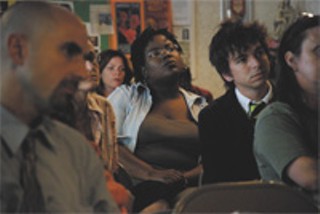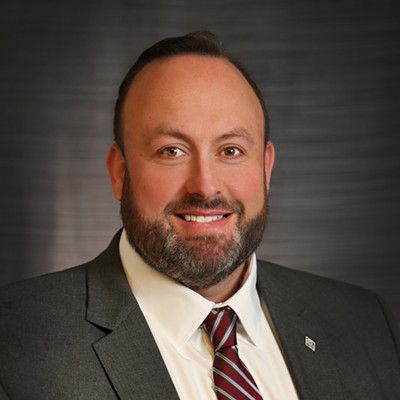THE 2007-2008 school year ended with a whimper throughout the state’s public schools. Almost 40 percent of Georgia’s eighth graders failed the standardized math test. That means that thousands of kids across the state spent the summer in school, and if they didn’t pass the exam a second time around then they’re going to the back of the line and repeating the eighth grade.
In Savannah, the pressure on the district’s schools to pass the state-mandated Criterion Referenced Competency Test (CRCT) has hit a boiling point. For years, many Savannah-Chatham County public schools have been on the state’s “Needs Improvement” list, which means that a percentage of schools in the district are not meeting the AYP (Adequate Yearly Progress), a benchmark set by the national No Child Left Behind Act of 2001.
But the validity of Georgia’s tests was called into question this year. Eighty percent of sixth and seventh graders failed the Social Studies CRCT, prompting Georgia Secretary of Education Kathy Cox to throw out the scores because they weren’t deemed trustworthy assessments of what was being taught.
To fully understand the public education landscape in Georgia, and the climate of what many have come to view as a “runaway test train” in Savannah-Chatham County public schools, it is necessary to understand that the foundation of all local policies are based on the controversial No Child Left Behind (NCLB).
The crux of NCLB is that every state in the U.S. must establish statewide academic standards and a testing system in reading and math for grades 3rd through 8th, and at least once during grades 10th through 12th. States must also have in place science assessments to be administered at least once during grades 3-5, grades 6-9, and grades 10-12. These tests are in addition to national standardized tests like the Iowa Test of Basic Skills.
Georgia has embraced NCLB as the answer to its education problems. It strengthened the national standards by mandating all grades take the state’s standardized test.
Locally, the Savannah-Chatham district added its own district-wide standardized tests as quarterly assessments. A typical first grader going to public school in Chatham County takes seven to twelve standardized tests, not including practice tests.
Because NCLB does not require a standardized test in Social Studies, Secretary Cox was at liberty to dump Georgia’s abysmal tests results without affecting Georgia’s Adequate Yearly Progress, chalking up the eighty percent failure to an alignment problem between the new Georgia Performance Standards (GPS) curriculum and the CRCTs.
But the math results are a different story. That test is required by NCLB, and to throw out the test would affect the state’s Adequate Yearly Progress.
Instead, Cox says, “We are holding our students to a higher standard so that when they get their diploma it will mean they are truly ready for the demands of the 21st century.”
But Michael Moore, a professor at Georgia Southern University in the Department of Curriculum, Foundations, and Reading, says the math scores should have been thrown out, too. At a 40-percent failure rate “it is clear that the test doesn’t measure what was being taught in the classroom,” he says.
What is unclear is how many eighth graders will actually be retained. Moore says that holding kids back based on the performance of one test contributes to a higher dropout rate, one of the reasons he is against the NCLB-mandated tests that have become known as “high-stakes tests.”
Nationally, there is a rally cry against NCLB, with education experts such as Alfie Kohn arguing that “people with little understanding of how children learn have imposed a heavy-handed, top-down, test-driven version of school reform that is lowering the quality of education in this country.”
Locally, the Chatham County Parent Coalition, is taking steps as well.
Julie Varland, a founding organizer, says her group formed after “witnessing children getting overloaded with tests and watching talented teachers become demoralized by the stream of non-negotiable testing polices.”
The Parent Coalition grew out of the Parent/Teacher Association at Charles Ellis Elementary School, and has been successful in attracting parents from other Savannah schools who share concerns over the inordinate amount of testing and loss of teaching time. (Moore says that testing in Savannah schools is equal to a least one month of teaching.)
The coalition has met with the Savannah-Chatham Board of Education and district Superintendent Thomas Lockamy twice, and insist they want to help the district in two areas: to align student evaluation with the vision of the Board of Education — “to ignite a passion for learning” — and to assist the district in finding out why teachers are leaving.
Varland believes if the district would accept their help, they could “bring education to life in Chatham County. Inspiring education will solve many of the district’s problems,” she says.
“We love parent involvement,” said School Board President Joe Buck in an open meeting of the Parent Coalition and the board, “but give us a little credit also.”
“They are a little defensive,” Varland says, “but we don’t want to make enemies of them, we’re coming to them in a spirit of cooperation.”
Since the “Needs Improvement” list began in 2003, the Savannah-Chatham district has been on it. In a state that is below the national average on reading and math scores, the Savannah-Chatham Schools are near the bottom —ranking 133 out of 173 districts in Georgia.
While the state toiled to develop more rigorous standards, the district looked for solutions. In 2005, the board hired Lockamy from Norfolk, Va., where he had experience raising achievement standards through district benchmarks.
“Every superintendent brings changes,” says Alfreda Goldwire, president of the Savannah Teachers Federation. She credits Lockamy with reforming what is called a site-based system, meaning individual schools had autonomy with little to no uniformity across the district.
Lockamy created district standardized tests that would support the state’s standards and give teachers and administrators a benchmark before sending them to take the high-stakes CRCTs.
But the Parent Coalition believes the four additional tests mandated by the district have resulted in “the system being taken over by the test train,” says Varland.
The coalition claims there is some sort of standardized test given in 70 out of 180 school days, and because the stakes are so high, teachers are forced to teach to the test.
Teachers are in agreement that the pervasive testing culture not only affects teacher retention, it is anti-learning.
“I spend a lot of time preparing students to be teachers,” says Moore. “I hate it that they are becoming test technicians.”
Goldwire describes an atmosphere of fear among teachers. “The district’s quarterly assessments weren’t suppose to evaluate the teacher,” says Goldwire, “but principals turned it into that.” She says, “teachers are being bullied by the administration, but some are starting to speak out.”
Varland is concerned that teachers are suffering repercussions for giving feedback to administrators. Goldwire agrees. “Retaliation is big in this district, anybody that speaks out is retaliated against.”
Case in point: After a March protest in front of the Board of Education office on Bull Street, Goldwire says several teachers were given Professional Development Plans, which is akin to a warning. The Savannah-Chatham Board of Education could not confirm this to be true.
One coalition member describes the situation as “a gun to Lockamy’s head by the state” to turn the district around. District Six board member Lori Brady says, “We are being held accountable. The superintendent and board have worked very diligently.”
Georgia’s new curriculum, the Georgia Performance Standards, has been ranked as one of the top ten curriculums in the country by an independent education think tank, the Thomas B. Fordham Institute.
Moore says that the even though eighty percent of middle schoolers failed the Social Studies CRCT, “the GPS are actually quite good.” The standards, says Moore, encourage inquiry and critical thinking, and thus are difficult to measure on a multiple question test.
The test itself, Moore says, was not written by the state, but by McGraw-Hill, who writes tests for over a dozen other states, and merely pulls questions from its enormous question bank, regardless of the state’s standards.
The state says this not true, and that the questions are vetted against Georgia’s curriculum by committees of teachers — though they are unable to answer the question “what went wrong with the test?”
At a Parent Coalition meeting, one resident, with no children of his own, said he was there because he wants the “school system fixed.”
A technology-based businessman with children now in college says he needs “smart workers” and doesn’t understand why the education system in Savannah can’t provide that.
A mother and professor at SCAD, who just transferred her son from public to private school, says some SCAD professors with children have decided to leave their jobs after discovering the state of the public schools.
“There just aren’t any good options for many people looking to move to Savannah,” she said.
Despite a rather rough start between the superintendent and the Parent Coalition, Varland believes they are on a good path. She and Moore, in a private meeting with Lockamy, have opened a dialogue with the administration.
According to the Coalition, Lockamy is planning on conducting a test audit in a sampling of different schools. Although Lockamy has standardized the system, many schools give tests above and beyond what is mandated by either the state or the district.
Penny Stone, the district assessment director, says that her office has asked for changes to eliminate some of the tests, “Some have been approved this year,” she says.

























